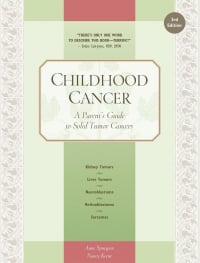Childhood Cancer
Emotional responses
Parents whose children are in remission think or speak of regrowth of the tumor with an almost palpable dread. Just the thought can cause an eruption of the same emotions that surged in them at diagnosis. Parents, their child, and the siblings may feel a wide array of emotions at recurrence: numbness, guilt, dread, anger, fear, confusion, denial, and grief. For parents whose child has had many years of stable MRI scans with no tumor growth, the scan that confirms their worst nightmare feels overwhelming.
I found that relapse was far worse than the original diagnosis. At diagnosis, after a certain period of adjustment, you think that treatment has a beginning, a middle, and an end. But relapse creates a bigger burden to accept. You begin to feel that maybe the disease is more powerful than the medicine. I found that for a while I just stopped functioning and thinking rationally. I felt like I was on a runaway freight train, hurtling toward an end that didn’t look so good anymore.
Parents often experience physical symptoms such as dizziness, nausea, fainting, and shortness of breath. They wonder how they can ask their child to endure treatment again. They wonder how they will survive it themselves. They may oscillate between optimism and panic.
My first relapse was the worst emotionally. Neither my parents nor I ever thought that after 5 years it would be back. I also had been so young when I was first treated that I didn’t understand that I could die from it. But at 13, I remembered clearly what I had been through, and all I could think was that it hadn’t worked. I told my parents that I wouldn’t do it again. My father sat me down and gave me a reality check. He explained that I would die if I didn’t get treatment. He said, “If you don’t do it for yourself, please do it for me and your mom.” The next morning I went into the clinic and started all over again.
Table of Contents
All Guides- Introduction
- 1. Diagnosis
- 2. Bone Sarcomas
- 3. Liver Cancers
- 4. Neuroblastoma
- 5. Retinoblastoma
- 6. Soft Tissue Sarcomas
- 7. Kidney Tumors
- 8. Telling Your Child and Others
- 9. Choosing a Treatment
- 10. Coping with Procedures
- 11. Forming a Partnership with the Medical Team
- 12. Hospitalization
- 13. Venous Catheters
- 14. Surgery
- 15. Chemotherapy
- 16. Common Side Effects of Treatment
- 17. Radiation Therapy
- 18. Stem Cell Transplantation
- 19. Siblings
- 20. Family and Friends
- 21. Communication and Behavior
- 22. School
- 23. Sources of Support
- 24. Nutrition
- 25. Medical and Financial Record-keeping
- 26. End of Treatment and Beyond
- 27. Recurrence
- 28. Death and Bereavement
- Appendix A. Blood Tests and What They Mean
- Appendix B. Resource Organizations
- Appendix C. Books, Websites, and Support Groups

